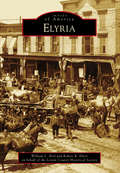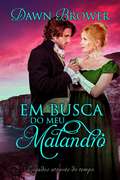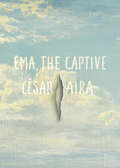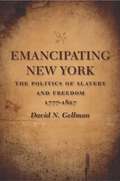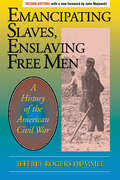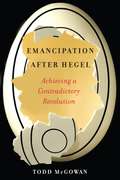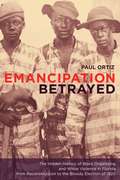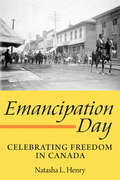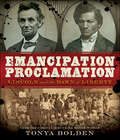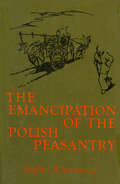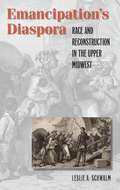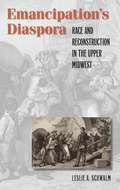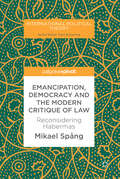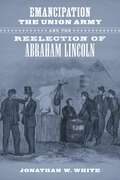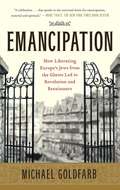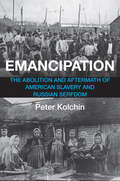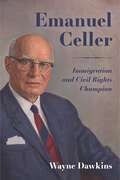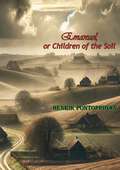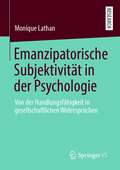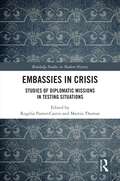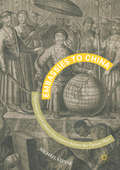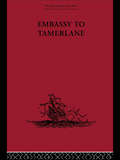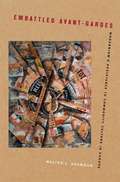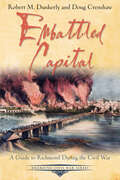- Table View
- List View
Elyria
by Robert R. Ebert Lorain County Historical Society William L. BirdElyria is named for Heman Ely, who in 1817 settled in a strategically located area close to Lake Erie along the picturesque Black River. Historically, Elyria, which became the seat of Lorain County, has been a center of commerce and government while also serving as a market and source of supplies for the surrounding agricultural community. Industrial development has included steel mills, quarries, automobile-related firms, and a wide variety of other manufacturing facilities. Over the years, Broad Street has been an important center of retail and professional activity. For recreation, Elyria's citizens are able to enjoy beautiful parks and recreation facilities.
Em Busca do Meu Malandro
by Beatriz Garcia Dawn BrowerA irmã de Alys Dewitt estava se casando. Para sua sorte, ela seria a madrinha do casamento onde o tema era a época da Regência, que teria como cenário um ducado de verdade no interior da Inglaterra. Enquanto está na festa de casamento, ela cai e viaja no tempo, acordando em 1815. Tudo era estranho, assombroso, e nada do que ela esperada que fosse. James Kendall, O Duque de Weston, retorna da guerra e encontra uma mulher machucada em sua propriedade. Ela murmura frases estranhas e o chamar por outro nome. Achando que ela estava louca por causa de seus ferimentos, ele a leva para a mansão e chama um médico. Eles sucumbirão aos desejos mútuos, ou Alys acharia um jeito de voltar para seu próprio tempo?
Ema the Captive
by César Aira Chris AndrewsEma The Captive, César Aira's second novel, is perhaps closest in style to his popular An Episode in the Life of a Landscape Painter and The Hare In nineteenth-century Argentina, Ema, a delicate woman of indeterminate origins, is captured by soldiers and taken, along with with her newborn babe, to live as a concubine in a crude fort on the very edges of civilization. The trip is appalling (deprivations and rapes prevail along the way), yet the real story commences once Ema arrives at the fort, where she takes on a succession of lovers among the soldiers and Indians, leading to a brave and grand entrepreneurial experiment. As is usual with Aira's work, the wonder of the book is in the details of customs, beauty, and language, and the curious, perplexing reality of human nature.
Emancipating Lincoln
by Harold HolzerEmancipating Lincoln seeks a new approach to the Emancipation Proclamation, a foundational text of American liberty that in recent years has been subject to woeful misinterpretation. These seventeen hundred words are Lincoln's most important piece of writing, responsible both for his being hailed as the Great Emancipator and for his being pilloried by those who consider his once-radical effort at emancipation insufficient and half-hearted. Harold Holzer, an award-winning Lincoln scholar, invites us to examine the impact of Lincoln’s momentous announcement at the moment of its creation, and then as its meaning has changed over time. Using neglected original sources, Holzer uncovers Lincoln’s very modern manipulation of the media-from his promulgation of disinformation to the ways he variously withheld, leaked, and promoted the Proclamation-in order to make his society-altering announcement palatable to America. Examining his agonizing revisions, we learn why a peerless prose writer executed what he regarded as his “greatest act” in leaden language. Turning from word to image, we see the complex responses in American sculpture, painting, and illustration across the past century and a half, as artists sought to criticize, lionize, and profit from Lincoln’s endeavor. Holzer shows the faults in applying our own standards to Lincoln’s efforts, but also demonstrates how Lincoln’s obfuscations made it nearly impossible to discern his true motives. As we approach the 150th anniversary of the Proclamation, this concise volume is a vivid depiction of the painfully slow march of all Americans-white and black, leaders and constituents-toward freedom.
Emancipating New York: The Politics of Slavery and Freedom, 1777–1827 (Antislavery, Abolition, and the Atlantic World)
by David N. GellmanAn innovative blend of cultural and political history, Emancipating New York is the most complete study to date of the abolition of slavery in New York state. Focusing on public opinion, David N. Gellman shows New Yorkers engaged in vigorous debates and determined activism during the final decades of the eighteenth century as they grappled with the possibility of freeing the state's black population. The gradual emancipation that began in New York in 1799 helped move an entire region of the country toward a historically rare slaveless democracy, creating a wedge in the United States that would ultimately lead to the Civil War. Gellman's comprehensive examination of the reasons for and timing of New York's dismantling of slavery provides a fascinating narrative of a citizenry addressing longstanding injustices central to some of the greatest traumas of American history.
Emancipating Slaves, Enslaving Free Men
by John Majewski Jeffrey HummelThis book combines a sweeping narrative of the Civil War with a bold new look at the war's significance for American society. Professor Hummel sees the Civil War as America's turning point: simultaneously the culmination and repudiation of the American revolution. While the chapters tell the story of the Civil War and discuss the issues raised in readable prose, each chapter is followed by a detailed bibliographical essay, looking at all the different major works on the subject, with their varying ideological viewpoints and conclusions. In his economic analysis of slavery, Professor Hummel takes a different view than the two major poles which have determined past discussions of the topic. While some writers claim that slavery was unprofitable and harmful to the Southern economy, and others maintain it was profitable and efficient for the South, Hummel uses the economic concept of Deadweight Loss to show that slavery was both highly profitable for slave owners and harmful to Southern economic development. While highly critical of Confederate policy, Hummel argues that the war was fought to prevent secession, not to end slavery, and that preservation of the Union was not necessary to end slavery: the North could have let the South secede peacefully, and slavery would still have been quickly terminated. Part of Hummel's argument is that the South crucially relied on the Northern states to return runaway slaves to their owners. This new edition has a substantial new introduction by the author, correcting and supplementing the account given in the first edition (the major revision is an increase in the estimate of total casualties) and a foreword by John Majewski, a rising star of Civil War studies.
Emancipation After Hegel: Achieving a Contradictory Revolution
by Todd McGowanHegel is making a comeback. After the decline of the Marxist Hegelianism that dominated the twentieth century, leading thinkers are rediscovering Hegel’s thought as a resource for contemporary politics. What does a notoriously difficult nineteenth-century German philosopher have to offer the present? How should we understand Hegel, and what does understanding Hegel teach us about confronting our most urgent challenges?In this book, Todd McGowan offers us a Hegel for the twenty-first century. Simultaneously an introduction to Hegel and a fundamental reimagining of Hegel’s project, Emancipation After Hegel presents a radical Hegel who speaks to a world overwhelmed by right-wing populism, authoritarianism, neoliberalism, and economic inequalities. McGowan argues that the revolutionary core of Hegel’s thought is contradiction. He reveals that contradiction is inexorable and that we must attempt to sustain it rather than overcoming it or dismissing it as a logical failure. McGowan contends that Hegel’s notion of contradiction, when applied to contemporary problems, challenges any assertion of unitary identity as every identity is in tension with itself and dependent on others. An accessible and compelling reinterpretation of an often-misunderstood thinker, this book shows us a way forward to a new politics of emancipation as we reconcile ourselves to the inevitability of contradiction and find solidarity in not belonging.
Emancipation Betrayed: The Hidden History of Black Organizing and White Violence in Florida from Reconstruction to the Bloody Election of 1920 (American Crossroads #16)
by Paul OrtizIn this penetrating examination of African American politics and culture, Paul Ortiz throws a powerful light on the struggle of black Floridians to create the first statewide civil rights movement against Jim Crow. Concentrating on the period between the end of slavery and the election of 1920, Emancipation Betrayed vividly demonstrates that the decades leading up to the historic voter registration drive of 1919-20 were marked by intense battles during which African Americans struck for higher wages, took up arms to prevent lynching, forged independent political alliances, boycotted segregated streetcars, and created a democratic historical memory of the Civil War and Reconstruction. Contrary to previous claims that African Americans made few strides toward building an effective civil rights movement during this period, Ortiz documents how black Floridians formed mutual aid organizations—secret societies, women's clubs, labor unions, and churches—to bolster dignity and survival in the harsh climate of Florida, which had the highest lynching rate of any state in the union. African Americans called on these institutions to build a statewide movement to regain the right to vote after World War I. African American women played a decisive role in the campaign as they mobilized in the months leading up to the passage of the Nineteenth Amendment. The 1920 contest culminated in the bloodiest Election Day in modern American history, when white supremacists and the Ku Klux Klan violently, and with state sanction, prevented African Americans from voting. Ortiz's eloquent interpretation of the many ways that black Floridians fought to expand the meaning of freedom beyond formal equality and his broader consideration of how people resist oppression and create new social movements illuminate a strategic era of United States history and reveal how the legacy of legal segregation continues to play itself out to this day.
Emancipation Day: Celebrating Freedom in Canada
by Natasha L. HenryWhen the passage of the Abolition of Slavery Act, effective August 1, 1834, ushered in the end of slavery throughout the British Empire, people of the African descent celebrated their newfound freedom. Now African-American fugitive slaves, free black immigrants, and the few remaining enslaved Africans could live unfettered live in Canada – a reality worthy of celebration. This new, well-researched book provides insight into the creation, development, and evolution of a distinct African-Canadian tradition through descriptive historical accounts and appealing images. The social, cultural, political, and educational practices of Emanipation Day festivities across Canada are explored, with emphasis on Ontario, Nova Scotia, New Brunswick, Quebec, and British Columbia. "Emancipation is not only a word in the dictionary, but an action to liberate one’s destiny. This outstanding book is superb in the interpretation of "the power of freedom" in one’s heart and mind – moving from 1834 to present." – Dr. Henry Bishop, Black Cultural Centre, Dartmouth, Nova Scotia
Emancipation Proclamation: Lincoln and the Dawn of Liberty (Carter G Woodson Award Book (Awards))
by Tonya BoldenPublished on the anniversary of when President Abraham Lincoln&’s order went into effect, this book offers readers a unique look at the events that led to the Emancipation Proclamation. Filled with little-known facts and fascinating details, it includes excerpts from historical sources, archival images, and new research that debunks myths about the Emancipation Proclamation and its causes. Complete with a timeline, glossary, and bibliography, Emancipation Proclamation is an engrossing new historical resource from award-winning children&’s book author Tonya Bolden.Praise for Emancipation Proclamation:FOUR STARRED REVIEWS "A convincing, handsomely produced argument..." —Kirkus Reviews, starred review "Bolden makes excellent use of primary sources; the pages are filled with archival photos, engravings, letters, posters, maps, newspaper articles, and other period documents. Detailed captions and a glossary interpret them for today&’s readers." —School Library Journal, starred review "The language soars, powerfully communicating not just the facts about the Emancipation Proclamation but its meaning for those who cared most passionately." —Booklist, starred review "Bolden tackles these questions in a richly illustrated overview of the lead-up to the Proclamation, organizing and reiterating information already familiar to many middle-schoolers, while introducing material that will probably be eye-opening to students who have taken their textbook&’s version of history at face value." —The Bulletin of the Center for Children&’s Books, starred reviewAward School Library Journal Best Book of 2013 Bulletin of the Center for Children's Books Blue Ribbons List 2013 Notable Children's Books from ALSC 2014 2014 Carter G.Woodson Middle Level Book Award
Emancipation's Diaspora
by Leslie A. SchwalmMost studies of emancipation's consequences have focused on the South. Moving the discussion to the North, Leslie Schwalm enriches our understanding of the national impact of the transition from slavery to freedom. Emancipation's Diaspora follows the lives and experiences of thousands of men and women who liberated themselves from slavery, made their way to overwhelmingly white communities in Iowa, Minnesota, and Wisconsin, and worked to live in dignity as free women and men and as citizens.Schwalm explores the hotly contested politics of black enfranchisement as well as collisions over segregation, civil rights, and the more informal politics of race--including how slavery and emancipation would be remembered and commemorated. She examines how gender shaped the politics of race, and how gender relations were contested and negotiated within the black community. Based on extensive archival research, Emancipation's Diaspora shows how in churches and schools, in voting booths and Masonic temples, in bustling cities and rural crossroads, black and white Midwesterners--women and men--shaped the local and national consequences of emancipation.
Emancipation's Diaspora: Race and Reconstruction in the Upper Midwest
by Leslie A. SchwalmMost studies of emancipation's consequences have focused on the South. Moving the discussion to the North, Schwalm enriches our understanding of the national impact of the transition from slavery to freedom. Emancipation's Diaspora follows the lives and experiences of thousands of men and women who liberated themselves from slavery, made their way to overwhelmingly white communities in Iowa, Minnesota, and Wisconsin, and worked to live in dignity as free women and men and as citizens. Schwalm explores the hotly contested politics of black enfranchisement as well as collisions over segregation, civil rights, and the more informal politics of race-- including how slavery and emancipation would be remembered and commemorated. She examines how gender shaped the politics of race, and how gender relations were contested and negotiated within the black community. Based on extensive archival research,Emancipation's Diaspora shows how in churches and schools, in voting booths and Masonic temples, in bustling cities and rural crossroads, black and white Midwesterners-- women and men-- shaped the local and national consequences of emancipation.
Emancipation, Democracy and the Modern Critique of Law: Reconsidering Habermas (International Political Theory)
by Mikael SpångThis book focuses on Jürgen Habermas’ theorising on law, rights and democracy in light of the modern critique of law. The latter tradition, which goes back to Hegel and Marx, has addressed the limitations of rights as vocabulary of emancipation and law as language of autonomy. Since Habermas claims that his reconstruction of private and public autonomy has an emancipatory aim, the author has chosen to discuss it in the context of the modern critique of law. More specifically, the study addresses the need to consider the dialectic of law, in which law is both a condition for emancipation and domination, when discussing what law and rights permit. It will appeal to students and scholars across the fields of political theory, law and legal criticism, as well as sociology and sociology of law.
Emancipation, the Union Army, and the Reelection of Abraham Lincoln (Conflicting Worlds: New Dimensions of the American Civil War)
by Jonathan W. WhiteThe Union army's overwhelming vote for Abraham Lincoln's reelection in 1864 has led many Civil War scholars to conclude that the soldiers supported the Republican Party and its effort to abolish slavery. In Emancipation, the Union Army, and the Reelection of Abraham Lincoln Jonathan W. White challenges this reigning paradigm in Civil War historiography, arguing instead that the soldier vote in the presidential election of 1864 is not a reliable index of the army's ideological motivation or political sentiment. Although 78 percent of the soldiers' votes were cast for Lincoln, White contends that this was not wholly due to a political or social conversion to the Republican Party. Rather, he argues, historians have ignored mitigating factors such as voter turnout, intimidation at the polls, and how soldiers voted in nonpresidential elections in 1864.While recognizing that many soldiers changed their views on slavery and emancipation during the war, White suggests that a considerable number still rejected the Republican platform, and that many who voted for Lincoln disagreed with his views on slavery. He likewise explains that many northerners considered a vote for the Democratic ticket as treasonous and an admission of defeat.Using previously untapped court-martial records from the National Archives, as well as manuscript collections from across the country, White convincingly revises many commonly held assumptions about the Civil War era and provides a deeper understanding of the Union Army.
Emancipation: How Liberating Europe's Jews from the Ghetto Led to Revolution and Renaissance
by Michael GoldfarbThe first popular history of the emancipation of Europe's Jews in the 18th and 19th centuries.
Emancipation: The Abolition and Aftermath of American Slavery and Russian Serfdom
by Peter KolchinIn this sequel to his landmark study, historian Peter Kolchin compares the transition to freedom after American emancipation with the Russian Great Reforms The two largest transitions from unfree to free labor of the many that occurred in Europe and the Americas during the nineteenth century took place in the United States and in Russia. Both occurred in the 1860s, and in both the former slaves and serfs strove to maximize their autonomy and freedom while the former masters worked to preserve as many of their prerogatives as possible. Both were partially—but only partially—successful. In this magisterial and long-awaited work, historian Peter Kolchin shows that a more radical break with the past was possible in the United States than in Russia, with the Southern freedpeople coming to enjoy republican citizenship, whereas Russian peasants remained subjects rather than citizens. Both countries saw conservative reactions triumph in the late nineteenth century. While this conservatism was common in most emancipations, it was especially strong in Russia and the American South, in part as a reaction against the major efforts to restructure the social order that went by the name of Reconstruction in the United States and the Great Reforms in Russia.
Emanuel Celler: Immigration and Civil Rights Champion
by Wayne DawkinsCongressman Emanuel Celler (1888–1981) was a New York City congressman who served in the United States House of Representatives from 1923 to 1973. Celler’s almost fifty-year career was highlighted by his long fight to eliminate national origin quotas as a basis for immigration restrictions and his battles for civil rights legislation. In Emanuel Celler: Immigration and Civil Rights Champion, author Wayne Dawkins introduces new readers to a figure integral to our contemporary political system. Celler’s own immigrant background framed his lifelong opposition to immigration restrictions and his corresponding support for reducing barriers for immigrant entry into the United States. After decades of struggle, he proposed and steered through the House the Hart-Celler Act of 1965, which eliminated national origins as a consideration for immigration, profoundly shaping modern America. Celler was also a consistent advocate for civil rights. As chairman of the House Judiciary Committee from 1949 to 1973 (except for a break from 1953 to 1955), Celler was involved in drafting and passing the Civil Rights Act of 1964, the Voting Rights Act of 1965, and the Civil Rights Act of 1968. During his career he was also deeply involved in landmark antitrust legislation, the establishment of US ties with the state of Israel, and the Gun Control Act of 1968, and was the author of three constitutional amendments, including the 25th that established presidential succession. Dawkins profiles a complex politician who shaped the central tenets of Democratic Party liberalism for much of the twentieth century and whose work remains central to the nation, and our political debates, today.From author Wayne Dawkins:Emanuel Celler (1888–1981) could be the most significant US legislator of the twentieth century. He cosponsored three Constitutional amendments—the twenty-third (voting rights for District of Columbia residents), the twenty-fourth (poll taxes banned), and the twenty-fifth (clear succession established if the president is removed from office). And, as a longtime chairman of the House Judiciary Committee, he reluctantly cosponsored a fourth—the twenty-sixth amendment (18-year-old voting rights).He is also linked to three-hundred laws, notably the Civil Rights Acts of 1957, 1960, 1964 and 1968; the Voting Rights Act of 1965; and his masterpiece, the Hart-Celler Immigration Reform Act of 1965.Over the past decade, Celler, who served fifty years in Congress, has been a supporting cast member in at least a dozen books about immigration or civil rights. He was frequently cited in One Mighty and Irresistible Tide (2020) and noted in two key moments of The Guarded Gate (2019). And he was cited generously in Goliath (2019), a book about Celler’s other passion—antitrust and monopoly busting.But this fall, he will at last be the focus of a full-length biography, Emanuel Celler: Immigration and Civil Rights Champion. And I believe it will become the go-to book for anyone wanting to know more about this history-making legislator.
Emanuel, or Children of the Soil
by Henrik PontoppidanImmerse yourself in the profound and evocative world of rural Denmark with Henrik Pontoppidan's Emanuel, or Children of the Soil. This literary masterpiece, written by one of Denmark’s most celebrated authors and a Nobel Prize laureate, offers a compelling exploration of the human condition, societal struggles, and the timeless connection between people and the land they inhabit.Set against the backdrop of the Danish countryside, Emanuel, or Children of the Soil follows the life of Emanuel Hansted, a young idealist with a deep love for nature and a passion for social justice. Emanuel's journey is one of personal growth and disillusionment as he confronts the harsh realities of rural life and the complexities of human nature.Pontoppidan’s rich and nuanced narrative delves into the lives of the rural community, portraying their joys, sorrows, and enduring spirit with great empathy and detail. Through Emanuel's interactions with the villagers, Pontoppidan examines themes of tradition, progress, and the inevitable conflicts that arise when old ways meet new ideas.The novel is a vivid portrayal of the socio-economic changes occurring in late 19th-century Denmark, capturing the tensions between the agrarian past and the industrial future. Pontoppidan's exquisite prose brings the Danish landscape to life, painting a vivid picture of the fields, forests, and farms that shape the characters' lives and destinies.Emanuel, or Children of the Soil is more than just a story of one man's journey; it is a reflection on the broader human experience, exploring universal themes of hope, struggle, and the quest for meaning. Pontoppidan’s deep philosophical insights and his ability to convey the inner lives of his characters make this novel a timeless and thought-provoking read.
Emanzipatorische Subjektivität in der Psychologie: Von der Handlungsfähigkeit in gesellschaftlichen Widersprüchen
by Monique LathanDas vorliegende Buch untersucht Konzepte emanzipatorischer Psychologie. Diese zeichnen sich dadurch aus, dass sie die Erkenntnis des Menschen über sich selbst bzw. wissenschaftliche Einsichten in die menschliche Subjektivität als den Weg und das Mittel erweiterter individueller und gesellschaftlicher Autonomie betrachten. Das Ziel der Untersuchung ist es, durch eine kritisch reflektierte Analyse und eine anschließende vergleichende Darstellung der unterschiedlichen, oft einander sogar widersprechenden, psychologischen Ansätze dem allgemeinen Anliegen psychologischer Emanzipation, den Gemeinsamkeiten und Unterschieden ihrer jeweiligen Schule sowie dem Stand der dabei gewonnenen Erkenntnisse auf die Spur zu kommen. Die Autorin Monique Lathan ist derzeit als wissenschaftliche Mitarbeiterin am Zentrum für Schul- und Bildungsforschung der Martin-Luther-Universität Halle-Wittenberg tätig. Die Schwerpunkte ihrer Forschung bilden die Rekonstruktion und Analyse psychologischer Theoriebildung sowie wissenschafts- und professionssoziologische Studien zur Akademisierung von Beschäftigung.
Embassies in Crisis: Studies of Diplomatic Missions in Testing Situations (Routledge Studies in Modern History)
by Rogelia Pastor-CastroEmbassies are integral to international diplomacy, their staff instrumental to inter-governmental dialogue, strategic partnerships, trading relationships and cultural exchange. But Embassies are also discreet political spaces. Notionally sovereign territory ‘immune’ from local jurisdiction, in moments of crisis Embassies have often been targets of protest and sites of confrontation. It is this aspect of Embassy experience that this collection of essays explores and Embassies in Crisis revisits flashpoints in the recent lives of Embassies overseas at times of acute political crisis. Ranging across multiple British and other embassy crises, unusually, this book offers equal insights to international historians and members of the diplomatic community.
Embassies to China
by Michael KeevakThis text is a timely and wide-ranging study providing essential background to the development of global modernity through the European encounter with China. Considering differing notions of peace, empire, trade, religion, and diplomacy as touchstones in the relations between China and Europe on mutuality, the book examines five encounters with France, Portugal, Holland, the pope, and Russia between 1248 and 1720, and reflects on concepts that the West took for granted but which did not successfully cross over into the Chinese world. This cutting edge text provides key insights into the cultural and political conflict which lay at the heart of early Chinese-European relations, as the West's understanding of the truth and appropriateness of its cultural norms was confronted by China's norms and beliefs.
Embassy to Tamerlane: 1403-1406
by Clavijo'Clavijo was so keen and intelligent an observer and so lively a retailer of travel gossip that this is a very welcome addition to the series.' New StatesmanCovering thousands of miles, Clavijo's epic journey began and ended in Cadiz taking in Rhodes, Constantinople, the Black Sea, and Central Asia.Guy Le Strange's extensive introduction gives excellent historical and political background for the account and the material is supplemented with seven maps and plans.
Embattled Avant-Gardes: Modernism's Resistance to Commodity Culture in Europe
by Walter AdamsonThis book provides a bold new perspective on a movement that defined the cultural landscape of the early twentieth century. Walter L. Adamson embarks on a lucid, wide-ranging exploration of the avant-garde practices through which the modernist generations coming after 1900 resisted the rise of commodity culture as a threat to authentic cultural expression.
Embattled Capital: A Guide to Richmond During the Civil War (Emerging Civil War Series)
by Robert M. Dunkerly Doug CrenshawA guide to the former Confederate capital of Richmond, Virginia, with “a good deal of historical information, much of it neglected in histories of the war” (The NYMAS Review).“On To Richmond!” cried editors for the New York Tribune in the spring of 1861. Thereafter, that call became the rallying cry for the North’s eastern armies as they marched, maneuvered, and fought their way toward the capital of the Confederacy.Just 100 miles from Washington, DC, Richmond served as a symbol of the rebellion itself. It was home to the Confederate Congress, cabinet, president, and military leadership. And it housed not only the Confederate government but also some of the Confederacy’s most important industry and infrastructure. The city was filled with prisons, hospitals, factories, training camps, and government offices.Through four years of war, armies battled at its doorsteps—and even penetrated its defenses. Civilians felt the impact of war in many ways: food shortages, rising inflation, a bread riot, industrial accidents, and eventually, military occupation. To this day, the war’s legacy remains deeply written into the city and its history.This book tells the story of the Confederate capital before, during, and after the Civil War, and serves as a guidebook including a comprehensive list of places to visit: the battlefields around the city, museums, historic sites, monuments, cemeteries, historical preservation groups, and more.
